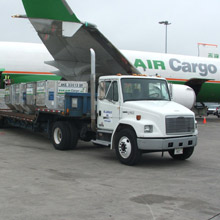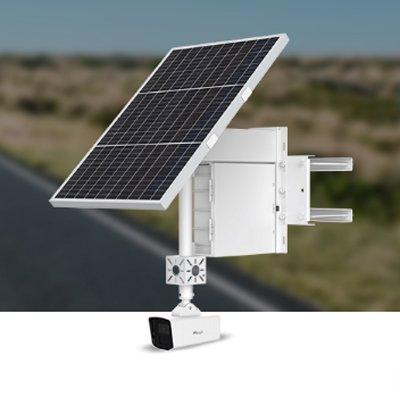 Cargo handler's commitment to security wins over international air carriers
Cargo handler's commitment to security wins over international air carriers
When Alliance Air sales representatives pitch to international air carrier users on the company's cargo handling and road feeder services, its commitment to security is one of the most persuasive selling points they can use.
Alliance Air has more than one million sq. ft. (93,000 sq m) of air cargo handling facilities at international airports in Chicago, New York, Miami and Atlanta, and operates a scheduled road feeder service to more than 225 cities across the U.S. and Canada.
Considering the value of their cargo and the enormous benefits associated with limiting losses due to theft, it's not surprising that air carriers pay attention when Alliance Air representatives pull out their laptops to demonstrate the company's state-of-the-art video security system.
"I just sent a copy of the March Networks DVR Viewer to our sales representative in China so he could use it during presentations to prospective customers," says Alliance Air security supervisor Will Truesdale.
The company purchased its first digital video surveillance systems in 2002, but began replacing it with 20 March Networks 4000 Series DVRs in July 2005.
Storage
"Our original DVR system was considered top of the line when we bought it," says Truesdale. "It replaced a VCR system and gave us 12 days of video storage, so we thought it was great at the time. It was a lot better than changing tapes every 24 hours, but 12 days of storage just doesn't meet our needs anymore."
The March Networks DVRs provide three months of video storage and higher quality video. Most air cargo handling companies have video surveillance systems, but Alliance Air was one of the first air cargo handlers to establish a dedicated in-house security department to oversee its access control and video surveillance systems.
From its control room in Chicago, security staff can monitor activities at cargo-handling facilities in New York, Miami, Atlanta and four warehouses at Chicago's O'Hare International Airport.
Air cargo is usually delivered to Alliance Air facilities on large aluminium pallets containing goods for multiple consignees. During ‘breakdown' operations, cargo handlers sort the freight by consignee and store it for customs clearance and pickup, or shipment to another destination via the company's road feeder service. Outbound cargo is consolidated by destination and loaded on pallets for delivery to aircraft.
Alliance Air security staff occasionally conduct live monitoring of breakdown and build-up operations, but primarily review archived video after an incident has been reported.
When the company decided it was time to upgrade its video surveillance system, its Florida-based security system supplier, Benham Security, immediately recommended March Networks DVRs. Truesdale and his team had an opportunity to trial an evaluation unit and quickly concurred with the recommendation.
"As soon as I started using it, I could tell that the March Networks system was more efficient. We all liked it from the start," he recalls.
Aside from the improved video quality and storage, Truesdale likes the March Networks Linux operating system stored in flash memory and the docking station design that allows a user to service a unit without having to disassemble the camera inputs or other cabling.
"With our previous system, if the hard-drive failed, the whole unit was dead," he says. "It wouldn't record, it wouldn't do anything. If a hard-drive fails in a March Networks DVR, you just replace the drive and you're back up and running. I thought that was a much better idea."
Docking station
As for the docking station architecture, Truesdale says: "I haven't had a reason to service a March Networks DVR yet, but I imagine that if I ever do, it will make a world of difference. Having to unhook and then reconnect multiple cables without mixing them up can be very time-consuming. The docking station design will make it a lot easier. It's more or less plug and play."
Truesdale was also pleased that he and his staff could log on to the system with one password and access any camera connected to the DVRs. With Alliance Air's previous system, a separate password was required for each DVR.
Using the March Networks DVR Configuration Tool, Truesdale can set user privileges for his staff and anyone else in the company, restricting access to specific cameras or DVRs if necessary.
Truesdale also likes the onscreen navigation system that allows him to control pan-tilt-zoom cameras using the computer's mouse. "Everything is done directly on the video screen," he says. "You use the scroll wheel to zoom in and out and point to where you want the camera to pan."
Alliance Air's video surveillance systems have been instrumental in resolving a number of incidents over the years and play an important role in securing the 55 million pounds of cargo the company handles every month.
With its state-of-the-art March Networks system, the company is now better equipped than ever to ensure that the cargo it handles is safe and secure.
















